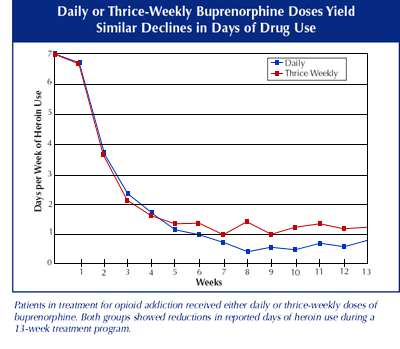Buprenorphine, a medication developed through NIDA-funded research, has been shown in clinical trials to be an effective treatment for opioid addiction when taken in daily doses. Research at Yale University School of Medicine in New Haven, Connecticut, now suggests that buprenorphine taken three times per week is similarly effective. This finding, says NIDA-supported investigator Dr. Richard Schottenfeld, makes buprenorphine an even more flexible alternative to methadone, a medication that has been used for decades to treat opioid addiction.
Methadone is the most widely used medication for opioid addiction, yet fewer than one in five heroin users now receive methadone treatment for their addiction, Dr. Schottenfeld says. A daily dosing requirement and distressing symptoms of withdrawal that can result from a missed dose cause some heroin users to drop out of or to forgo methadone treatment programs. “Buprenorphine has relatively mild withdrawal symptoms, and a treatment schedule that does not require daily dosing could significantly increase the number of heroin users seeking treatment when buprenorphine becomes available,” he says. Buprenorphine is in the final stages of the Food and Drug Administration (FDA) approval process.

Dr. Schottenfeld and his colleagues compared the effectiveness of daily versus thrice-weekly administration of buprenorphine in a 12-week trial involving 92 participants (73 percent white, 75 percent male) who met diagnostic criteria for opioid dependence and FDA criteria for eligibility in methadone maintenance treatment, but who were not currently in treatment. Forty-five participants were assigned to receive daily buprenorphine in an average daily dose of 16 mg per 70 kg of weight. Forty-seven participants received doses of 34 mg per 70 kg of weight on Fridays and Sundays, 44 mg per 70 kg of weight on Tuesdays, and a placebo on other days. All 92 study participants provided urine samples on Mondays, Wednesdays, and Fridays. All samples were analyzed for opioids and cocaine metabolites, and one sample per week from each participant was tested for benzodiazepines.
“There were no significant differences between groups in reduction of opioid use, in retention in the treatment program, or in cocaine use,” Dr. Schottenfeld says. “Interviews with the participants suggest that they couldn’t reliably tell whether they were receiving the medication daily or three times each week.”
Roughly three-quarters of the participants (77 percent of those receiving thrice-weekly and 71 percent of those receiving daily medication) completed the full 12-week program. The proportion of opioid-positive urine samples dropped consistently through the course of treatment (to 57 percent in the daily and 58 percent in the thrice-weekly group), and participants in both groups reported substantial reductions in illicit drug use. The similarity in drug use is evidence that the participants felt no stronger urge to use opioids than those on the daily schedule, Dr. Schottenfeld says. Equally important, he notes, is the fact that both groups were equally likely to stay in treatment, to show up on time for treatment, and to attend regularly scheduled counseling sessions.
In this study, all participants made daily clinic visits even though the thrice-weekly group received medication only every third day. Additional research is needed to determine the effectiveness of thrice-weekly dosing on a schedule that does not require daily contact, Dr. Schottenfeld says. Still, he adds, the finding that thrice-weekly dosing can be as effective as daily dosing in treatment outcome is an important step forward that builds on previous research indicating that some patients would prefer less-than-daily dosing of medication.
“This schedule of treatment could substantially reduce the cost to clinics and the inconvenience to patients. It can also help move use of buprenorphine beyond the traditional narcotic treatment programs and into new treatment settings, such as primary care clinics or physicians’ offices,” Dr. Schottenfeld says.
Source
- Schottenfeld, R.S.; Pakes, J.; O’Conner, P.; Chewarski, M.; Oliveto, A.; and Kosten, T.R. Thrice-weekly versus daily buprenorphine maintenance. Biological Psychiatry 47(12):1072-1079, 2000.
